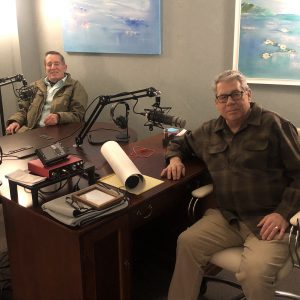Podcast: Play in new window | Download (Duration: 50:48 — 69.8MB)

Born and raised in Illinois, Joe Campbell graduated from the Marmion Military Academy in 1965. Shortly after, he enlisted and served four years in the U.S. Army. During his enlistment, Joe served with the 8th Infantry Division in Bad Kreuznach, Germany as well as the 1st Logistical Command in Vietnam. Over the last several decades, Joe has committed himself to serve and help other military veterans. He has served as a Trustee for the Milwaukee County War Memorial Corporation, Inc, a Chaplain with the Vietnam Veterans of America Milwaukee Chapter, and has held executive positions at several veteran-oriented organizations, including his own machinery and welding company. Due to his service and commitment to help his fellow veterans, Joe has received several awards and accolades, including the 2018 Patriot Award from the War Memorial Center and the 2007 Veteran of the Year Award by Milwaukee County.
Joe joins us today to share his experience of serving in the U.S. Army during the Vietnam War. He explains why he chose to enlist in the Army instead of waiting to be drafted, why he was anxious to fight in the Vietnam War, and how the realities of war compared to his initial expectations. He shares the shocking realities of returning home after serving in Vietnam, how he was treated, and why he felt like an ‘outsider’ even within the U.S borders. He discusses the impact that burying his feelings and emotions about losing battle buddies has had on his life, how it led to his addiction to alcohol, and how the gift of sobriety helped him cope with those buried emotions. Joe also shares his motivation to connect with veteran outreach programs and dedicate himself to helping other combat veterans.
“The greatest gift I have is to live a good life for those guys and gals that gave their life for me. And the only way I can really thank them is by living a good life because of them.” – Joe Campbell
This week on the Stigma Free Vet Zone Podcast:
- Life before the military and why Joe enlisted in the U.S. Army
- His experience while serving in Germany
- Why Joe was anxious to serve in the Vietnam War and why he didn’t want his family and fiancee to know that he volunteered to go to Vietnam
- Joe’s experiences while serving in Vietnam and how his arrival compared to his expectations
- Adjusting to life in the battlefield
- The human component of the Vietnam War
- What it was like to return home after serving in Vietnam
- Adjusting to the ‘new norm’ after being discharged from the military
- Why Joe initially chose not to talk about his Vietnam experiences, except to those closest to him
- The impact of burying his feelings and emotions about his experiences – and losses – while serving his country and how it led to his addiction to alcohol
- What eventually inspired Joe to turn his life around and dedicate himself to helping other combat veterans
- How the gift of sobriety helped him cope with his experiences of Vietnam and the memories that flooded back at the Vietnam Traveling Memorial Wall
- The brotherhood of support Joe found to help him cope with the traumas of war
Helping Veterans & Their Families Transition to Civilian Life
Thanks for tuning into this segment of the Stigma Free Vet Zone podcast, the show dedicated to helping veterans and their families make the transition from the military to civilian life and culture. If you enjoyed this episode, please head over to Apple Podcasts to subscribe to the show and leave a review. For more stories, insight, and resources on coping with military-related trauma and PTSD, visit our website and follow us on Facebook and LinkedIn. Don’t forget to share your favorite episodes across social media to help us raise awareness and help our brothers and sisters and their families transition to civilian life.
DISCLAIMER: The information and content shared in each episode of the Stigma Free Vet Zone are for informational purposes only. The Stigma Free Vet Zone hosts, Mike Orban & Bob Bach, are not, nor claim to be, medical doctors, psychologists, or psychiatrists and should not be held responsible for any claims, medical advice, or therapy/treatment recommendations mentioned on this podcast. Any advice mentioned or shared by Mike Orban, Bob Bach, or their guests is strictly for purposes of bringing awareness to the veteran community and the services available. Please speak with a medical professional before taking any advice or starting any therapy or treatment discussed or shared on this podcast.




 Bob interview
Bob interview